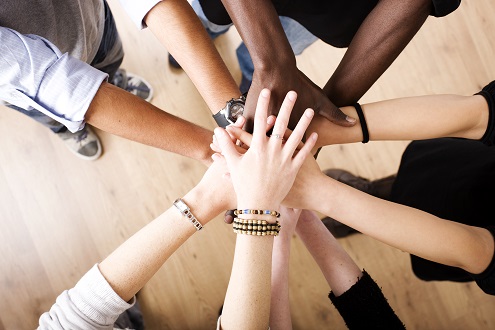Counseling groups offer a rich opportunity to learn helpful skills and to practice interacting in effective ways.
Groups listed below are currently not meeting.
Women’s Circle
Women’s Circle is a counseling group for people who identify as female who live in the Blacksburg, Virginia area.
Read more about Women’s Circle
Co-traveling with Hardship
Use research-informed skills to move forward, no longer overpowered by hardships but co-traveling with them.
For many who have experienced losses, traumatic losses, and other hardships, personal and social expectations may be to “Get over it!” What’s done cannot be undone, however, and effects of hardships may linger. Often people think, “I should be doing better!” even though hardships have powerful impacts. People may have difficulty concentrating and feeling motivated, find themselves over-watching TV or overeating food, and opting out of social activities. They may experience symptoms of anxiety, depression, overuse of alcohol and other substances, behaviors termed “addictions,” and relationship challenges. This group helps people compassionately acknowledge feelings and thoughts associated with hardships and use research-informed skills to move ahead, no longer overpowered by hardships but co-traveling with them.
- (Not currently scheduled)
Awareness Skills Group
Learn and practice research-backed skills to address problematic behaviors including substance use.
- (Not currently scheduled.)
- Open enrollments. Individuals can become members at at any time.
- More about Awareness Skills
- More about the Awareness Skills curriculum
Cognitive Behavior Therapy (CBT) Group
Learn and practice research-backed skills to address challenging symptoms of anxiety, depression, unrelenting grief, substance use disorders, behaviors termed “addictions,” eating disorders, trauma, thought disorders, and severe mental illnesses.
- (Not currently scheduled.)
Group protocols are informed by cognitive theory and neuroscience and include components of cognitive behavior therapy (CBT), dialectical behavior therapy (DBT), and cognitive processing therapy (CPT).
Cognitive Processing Therapy (CPT) Enrichment Group
Work in synergy with others to practice and deepen use of CPT skills.
For clients who identify as female, are interested in Cognitive Processing Therapy (CPT) for trauma, have completed several individual sessions, or have completed the protocol, we offer a group for learning, practicing and applying CPT skills in the supportive company of others. CPT provides a way to understand why recovery from traumatic events is difficult and how symptoms of trauma affect daily life. The focus is on identifying how traumatic experiences change thoughts and beliefs, and how thoughts influence current feelings and behaviors. With new awareness and skills, the natural human ability to heal from hard times is freed, as are people to continue on without the conscious and unconscious domination of trauma in their lives. Please read more about Cognitive Processing Therapy.
- (Currently not scheduled)
The groups listed below may be available with sufficient enrollment:
Applied Awareness Skills Group
Use awareness skills to optimize ways of thinking, feeling, behaving, interacting, relating, and working.
Prerequisite: Completion of Awareness Skills curriculum.
- (Currently not scheduled)
Partnership Skills Strengthening Group
Couples, family members, employees, and team members learn and practice skills to increase the effectiveness of their interactions with each other.
- (Currently not scheduled)
- Three, 60-minutes sessions.
- The series can be taken multiple times. If one partner cannot attend a session, the other partner is welcome to attend.
- More about the Partnership Strengthening Skills Group
Counseling-Assisted Treatment (CAT) group for people prescribed medication for substance use disorders and/or mental illnesses. The group is described here.
- (Currently not scheduled)
Self-Kindness Group
Learn and practice skills to address troubling feelings, thoughts, words, and actions that arise in troubling times.
Note: The Self-Kindness Group met from April 16 through June 11, 2020 to support Virginia residents during the shelter-at-home order. For those interested, here are the materials we used.
- (Currently not scheduled)
- Self-Kindness Group Protocol
- Here’s a full description of the Self-Kindness Group, notes from the inaugural session, and the group’s information page.
- Self-kindness develops naturally through learning awareness skills.
To request an appointment for individual and/or group counseling, please learn more about appointments and fees, then contact me to register as a new client through the client portal.
. . . . .
More about our skills-focused groups for people with substance use concerns
In our skills-focused groups, we work with specific approaches that research suggests are most helpful to people who want to end or reduce their use of substances that have become problematic for them.
People who have difficulties with substances, binge-eating, gambling, shopping, Internet gaming, serial relationships, self-harming, or other challenges, and who return to problematic behavior, frequently cite interactions with others as preceding unplanned use or behavior.
Through support from the facilitator and fellow group members, individuals can identify patterns of dealing with others and make helpful modifications to:
- better regulate emotions
- get needs met
- re-balance after over-functioning or under-functioning in relationships
- feel closer to loved ones
- be more effective with co-workers and acquaintances
- skillfully manage problematic behaviors
- navigate and negotiate conflict
- make more conscious choices about what might be the next most helpful thing to say or do – or not say or not do.
Group counseling offers exciting possibilities for self-discovery in connection with others.
Sample schedule for a 75-minute group session:
- Welcome and announcements.
- Review of group policies.
- Check-in with a 2-minute timer.
- Brief explanation of a new skill. (10 minutes)
- Practice using new skill. (10 minutes)
- Practice using new skill in synthesis with formerly learned skills. (20 minutes)
- Check-out with a buffet of wisdom through individual statements of observation, awareness, insight, and progress. (10-15 minutes)
- Awards of appreciation.
I am very happy to provide letters for those who need documentation of attendance.
Welcome! If you would like to join a group, please contact me.
Last updated 6/1/22


